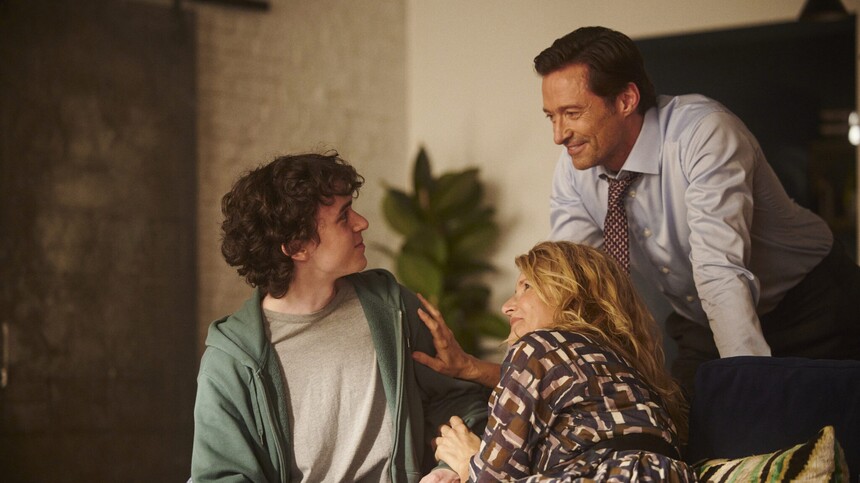Review: THE SON, A Nearly Criminal Misuse of Everyone Involved

Three years ago, the collaboration between playwright-turned-filmmaker Florian Zeller and Anthony Hopkins, The Father, netted two Oscars, including an Academy Award for Best Actor for Hopkins’ deeply moving portrayal of an elderly man suffering from late-stage dementia.
More than a tour-de-force for the now 85-year-old actor (though it certainly qualified), The Father succeeded at turning a wholly interior, personal experience, epically struggling to live with dementia, into a richly textured, multi-faceted cinematic one. Their reunion, however large or small, boded well when Hopkins took a supporting, if presumably pivotal, role in Zeller’s next film, The Son. Like its cinematic predecessor, The Son is based on a 2018 play written by Zeller, and once again adapted for the big screen by Oscar-winner Christopher Hampton.
Despite Hopkins’ presence, however, in a key scene that, expanded, could have worked magnificently as a one-act play, The Son fails on practically every level outside of its central cast, all doing their level best to breathe life into barely sketched-out, one-note characters. There’s only so much even the most talented performer can do, however, with trite, trivial material, cliche-laden dialogue, and unpersuasive, ungrounded plot turns. It's the worst kind of melodrama, and a loosely organized plot about absent fathers, physically or emotionally, and teen self-harm/suicide (or the potential thereof) doesn't help.
As a subject, clinical depression among teens deserves far better, but we’re getting ahead of ourselves slightly. Centered on Hugh Jackman’s nebulously employed Peter Miller, a self-centered senior partner at a New York law firm, The Son places him as both “the son” of the title and the father of a bitter, despairing teen son, Nicholas (Zen McGrath), and two women, Beth (Vanessa Kirby), Peter’s much younger second wife and mother to Peter’s newborn son, Theo, and Kate (Laura Dern), the starter wife Peter selfishly discarded when Beth showed interest in him at a party.
On its own, the constellation of characters and relationships should have provided Zeller with sufficient material to explore how, why, and when adults, well-meaning and otherwise, find themselves above their depth, struggling to decipher the clues in a teen’s behavior and ultimately doing the right thing (whatever that is) for everyone involved. Instead, Zeller and Hampton’s script makes Peter and to a lesser extent, Kate, clueless to the point of active negligence in handling Nicholas’s apparent spiral: Peter agrees to let Nicholas move into his condo, immediately causing friction with Beth and between Nicholas and Beth while Kate all but gives up, leaving Nicholas in Peter’s obviously non-capable hands.
It’s only a matter of time before a volatile situation filled with doltish, emotionally deficient, upper-middle-class characters goes pear-shaped, but Zeller stretches an already thin plot to the breaking point, repeatedly circling back to redundant, insight-free scenes involving a distraught Peter and a flailing Nicholas. And when Nicholas, facing pressure to conform (i.e., return to school and regular teen activities) rejects any and every attempt at help, Peter and Kate make the absolute worst choice possible.
It’s also a clumsily predictable one as badly foreshadowed as it is executed story-wise. Apparently, though, it was more than fine with Zeller and his collaborators on either side of the camera.
As Peter’s unapologetically narcissistic patrician father, Anthony, a high-ranking diplomat who himself sacrificed his family for his career, leaving a teenaged Peter to fend for himself, Hopkins unsurprisingly delivers a knockout performance. In just a few minutes of screen time, Hopkins gives the audience a tantalizing glimpse of a far better, far more involving, or engaging film centered on Peter and his monstrous father, a man accustomed to always speaking his mind regardless of the emotional injury or subsequent trauma caused by said openness.
Unfortunately for The Son and the audience, once Hopkins exits, it’s back to Afterschool Special melodrama and the slow-motion plot turns until The Son stumbles towards an inevitable, preordained denouement.
The Son opens Friday, January 20, in movie theaters throughout North America via Sony Pictures Classics. Visit the official site for more information.







